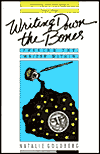
Writing Down the Bones: Freeing the Writer Within by Natalie Goldberg
Stephen Griffith's Journal
Multiple blogs became difficult to maintain, so this journal combines all my interests--reading, writing, China, being a stay-at-home Dad, theology, politics, movies, etc.

"Rare is the writer who actually knows what he's written when it first comesout on paper. A passage you think is clear won't be. A character you think is fascinating will bore other people silly because you haven't yet grasped what it is that makes him interesting. But you won't know it until someone else has read it and told you.
"Who? Your workshop? A teacher?
"They really can't do the job you need. You need someone to read it now, today, the minute you finish it. Someone who is committed to your career and wants you to succeed almost as much as you do.
"In other words, you need a spouse, or very close friend who is a brilliant critic.
"...Here's the good news: You can turn almost any intelligent, committed person into the Wise Reader you need. But first you have to understand that a Wise Reader is not someone to tell you what to do next, it's someone to tell you what you have just done. In other words you want your spouse or friend to report to you, in detail and accurately, on the experience of reading your story."
"...[Don't] imagine for a moment that he [the Wise Reader] can tell you how to fix your story. All he can tell you is what it feels like to read it."
* High Interest? What parts of the story kept you riveted to your seat? Werethere parts where you lost interest or found your mind wandering? Were thereparts that were out-and-out boring?
(This helps point the author toward sections of the story that needrevision, rearranging, or cutting.)
* Engaging Characters? What did you feel about each character? Love him? Hate him? Captured by him? Filled with apathy and inertia? Did you keep getting him confused with another character, or (really bad news!) forget who he was from chapter to chapter?
(This lets the author know when his readership is feeling the right thingsabout a character, and for the right reasons.)
* Clear Presentation? Did you understand all the scenes? If a scene is meant to convey mystery or confusion, did it come off that way? Were there places where you had to reread to get the picture of what the author was trying to say?
(This points to places where exposition is not handled properly, or the writing is plain confusing.)
* High Credibility? Were all the scenes, characters, actions, and dialoguebelievable? or were there spots where you simply could not buy what washappening in the story?
(This highlights cliches and areas needing better detail and explanation.)
* Effective Resolution? What do you think will happen next in the story? Arethere areas of confusion remaining, questions left unanswered, issues leftunresolved?
(If the reading is a fragment, questions left unanswered will notify the author about the conflicts and tensions he has successfully created. On the other hand, in a scene or complete work, it can also tell him what he has failed to explain to the reader's satisfaction.)
